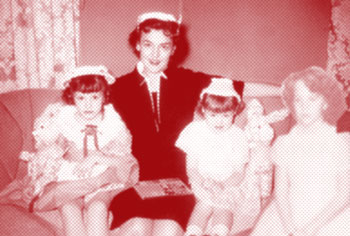Page 1 Page 2

My parents have been married for fifty-one years. Their successful union is due, in part, to my father’s ability to ignore the circus sideshow that went on in our house on Sunday mornings during the first decade and a half of their marriage. My father had very little to say when I was growing up. He was a quiet man who only spoke when he had something worth saying, something like, “Get the hell out from in front of the TV.” He worked hard to provide for us and was of good moral character. We always knew he loved us, even though he never said so. He was a product of the Silent Generation — duty before self, earn your own way through hard work, and don’t ruffle any feathers. He drove a bus for a living and worked odd shifts, so we saw very little of him but, when we did, we didn’t quite know what to make of him. So, we sort of tip-toed around him, careful not to make too much noise or block his view of the TV.
Sundays were one of the only days that my father was almost always at home, but I can’t remember a single instance of him attending church with us. I think he reasoned that Sunday was supposed to be a day of rest and, after a six-day work week, by God, that’s just what he was going to do. Either that, or he had simply seen my mother’s Sunday morning freak show one too many times and wanted no part of it. So, like Timothy Leary, he turned on (the TV), tuned in (to the Gospel Jubilee TV show), and dropped out (of reality), preferring to chain-smoke, drink coffee, and tap his foot to the peppy gospel tunes sung by The Florida Boys and the Happy Goodman Family while relaxing in his recliner.
My mother told us that dad was “going to hell in a handbasket” if he didn’t get his heart right with God. Under her breath (but loud enough for dad to hear her), she vowed to never stop praying for his soul, and told us that we should do the same. She said that if we prayed long and hard enough, the Lord would “convict his heart” so that he would feel led to join his family in church on Sunday. But, my sisters and I didn’t care at all if dad went to church with us. In fact, we wanted to stay home with him and watch the Gospel Jubilee show, too. It was quite entertaining, as I recall. The Happy Goodman Family was my favorite act. They were a group of Pentecostal Christian singers made up of Howard Goodman and his wife, Vestal, and several of Howard’s brothers. In those days, Pentecostal Christian women were not allowed to cut their hair, and could not wear make-up or pants. As a way of styling their never-been-cut hair, the older Pentecostal women would swirl their hair up into the biggest beehives you’ve ever seen. I couldn’t wait each week to see how high Vestal’s hair would be. Evidently, she was a believer in “the higher the hair, the closer to God.”
Vestal would belt out those Southern gospel tunes with the enthusiasm that made me believe she truly was “bound for Glory” as her songs indicated. The Goodman brothers sang harmony with her while her husband, Howard, banged out a syncopated rhythm on the piano that would have every listener toe-tapping and counting down the days until they reached “heaven’s pearly gates.” I wondered why they made it sound like dying was something to look forward to. Personally, I rather liked my life and wasn’t in any hurry to leave it, not even for a mansion in heaven.
So, after dragging us away from The Gospel Jubilee, my mother’s Sunday morning ritual would begin. She had a penchant for dressing the three of us alike; the same dress, but in different pastel colors. I always wanted pink, leaving my sisters with the blue and yellow dresses. Getting our lacy tights on was a real nightmare for my mother. We all hated them and would do our best to wrestle out of them as she struggled to put them on. Next came the patent leather Mary Janes. As if the “itchy” lace tights weren’t enough, she had to listen to us whine about how the shoes pinched our feet. Then came the lacy slips (“itchy” too), the dresses (also “itchy”), and finally the white gloves. After that came the “sit-your- whiney-asses-down-on-the-couch-and-don’t-move-a-muscle-until-we-leave” speech.
At this point, my mother would be so exasperated, she would begin to hyperventilate. While we sat seemingly motionless on the couch, we could see her in the kitchen breathing into a paper bag, as the doctor had instructed her to do when she informed him of her Sunday morning episodes. We held back our snickers until we couldn’t. “You three hellions are going to send me to an early grave,” she’d yell. My dad completely ignored our shenanigans and lit up another cigarette.
After we three “hellions” left home, my dad began attending church with my mother. Mom surmised that her years of diligent praying for my father’s soul had finally paid off. I surmised that my dad had just been waiting for the sideshow to end.
Page 1 Page 2
Pages: 1 2


Interesting
“…pint-sized bottle of polka-dotted Pepto-Bismol”– haha love it! This was really witty and honest. Your descriptions are very visceral, too!